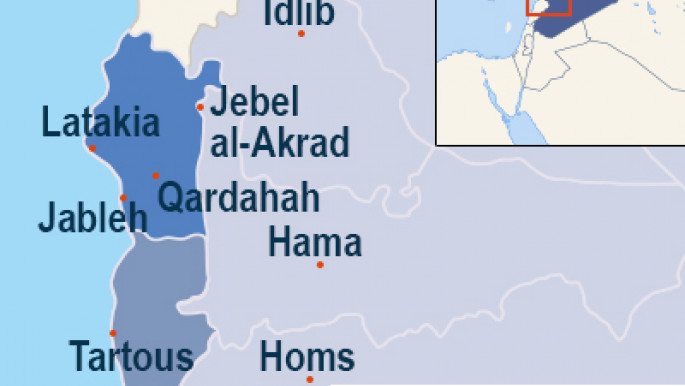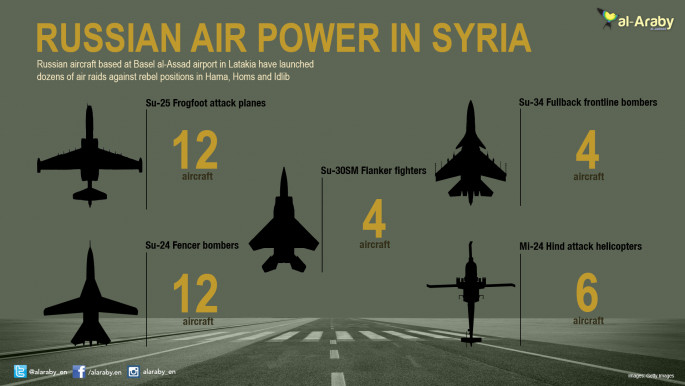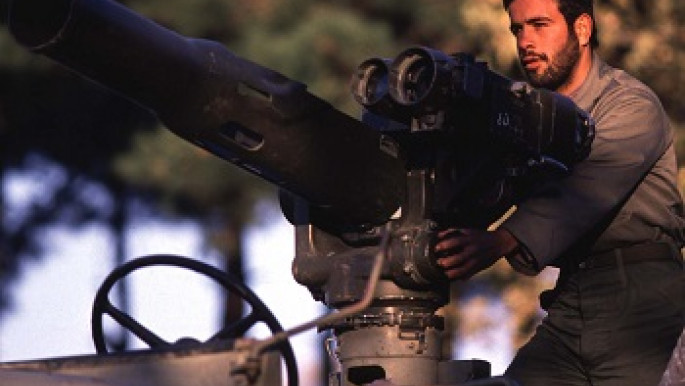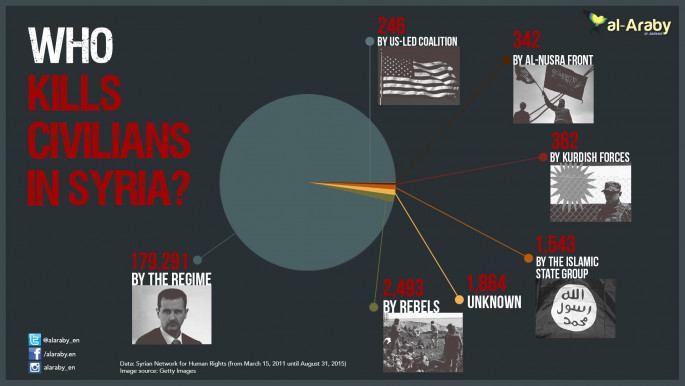Syrian army plans offensive in Aleppo with Russian support
The offensive would expand on a ground attack launched by the same alliance last week that is targeting rebels in Hama province further west.
The officials, speaking on condition of anonymity, said thousands of Iranian troops had arrived to take part in the ground offensives in support of President Bashar al-Assad.
A big government offensive in the area near the Turkish border is likely to further anger NATO member Ankara, which has backed insurgents fighting Assad and has already expressed deep concern over Russian airstrikes that have targeted them.
Control of Aleppo city and the surrounding province is divided among the Syrian government, a range of rebel groups fighting Assad, and the Islamic State group (IS, formerly ISIS) that controls some rural areas near the city.
 |
|
"The big battle preparations in that area are clear," said one of the officials. "There is a large mobilisation of the Syrian army ... elite Hizballah fighters, and thousands of Iranians who arrived in stages in recent days," said the official.
The second official, who is close to the Syrian government, said: "The decision to launch the battle of Aleppo has been taken ... It is no longer hidden that thousands of Iranians are now in Syria and their role is fundamental."
Both officials said the attack would begin soon.
A general in the Iranian Revolutionary Guards Corps, Hossein Hamedani, was killed in Aleppo province while advising the Syrian army on their battle against Islamic State in the area, the guards said on Friday.
Islamic State and other insurgents, including groups backed by Assad's foreign enemies, have been fighting each other north of Aleppo in an area of territory where Turkey and the United States have been laying plans to crush IS.
Russia says its airstrikes in Syria that began Sept. 30 were targeting IS, though many of them have struck in areas held by other rebel groups, including some that have received backing from Assad's foreign enemies.
 |
The rebels fortify their lines
Syrian rebels are deploying extensive supplies of anti-tank missiles provided by their foreign backers to counter ground attacks by the Syrian army and its allies, backed by heavy Russian airstrikes, rebel commanders told Reuters Tuesday.
The rebel commanders declined to confirm whether they had received additional missiles since the Russian airstrikes began, but said they had "excellent" supplies and were stationing them along a 30-km front to halt the ground offensive.
Activists, however, said supplies had been stepped up since the Russian airstrikes began on Sept. 30.
With Russian air support and help from Lebanon's Hizballah and Iranian soldiers, with Quds Force commander Maj. Gen. Qasem Soleimani also believed to be in the country, the Syrian army is trying to drive rebels from western areas that are crucial to President Bashar Assad's survival, and has recaptured several towns in the provinces of Hama and Latakia.
Russia's 2-week-old air campaign has bolstered Assad and left the United States struggling to adjust its troubled military support programme for Assad's opponents. On the ground, however, the Syrian army is not making rapid gains.
The Syrian Observatory for Human Rights, a Britain-based group tracking the war, said a battle was in progress for control of the town of Kafr Nabouda in Hama province, which the army said it captured Monday.
At least 25 fighters on the government's side were killed, it said. The town marks the western edge of the defensive line along which the rebels have stationed a dozen anti-tank missile launch platforms, said Ahmed al-Seoud, head of the 13th Division, a foreign-backed faction fighting under the umbrella of the Free Syrian Army.
"They are highly effective. They are breaking the Russian-Iranian and Syrian army."
Foreign states opposed to Assad have supplied the TOW guided missiles to a number of rebel groups via an operations room in Turkey.
The missiles have been widely seen as important to rebel advances earlier this year that had put Assad under pressure.
The Observatory's director, Rami Abdel-Rahman, said the rebels were using significant numbers of TOWs. "It increased in the last days, and it has proved its effectiveness."
Ibrahim al-Idlibi, an activist who acts as media adviser to several FSA groups in northern Syria, said several dozen army vehicles had been destroyed by TOW missiles in recent days.
Fares al-Bayoush, a former Syrian army colonel who heads the Fursan al-Haq group, also spoke of a battery of TOW missile platforms stretching east along the front line from Kafr Nabouda to the village of Maan.
 |
|
| TOW anti-tank missile [Getty] |
The aim is to stop government forces advancing north from Morek to rebel-held Khan Sheikhoun, both towns on a north-south highway linking the city of Hama to Aleppo and Idlib, and also to attack.
Echoing the objective to go back on the offensive, an alliance of rebels that has been targeted by Russian airstrikes said Tuesday it was starting an operation to recapture Hama.
The Army of Conquest, which captured most of the neighboring Idlib province in May, includes al-Qaeda's Syria wing al-Nusra Front, the Islamist Ahrar al-Sham faction and groups including Chechen and central Asian fighters. But it will struggle to advance in the face of the Russian airstrikes and Syrian army assault, Abdel-Rahman said.
Both sides have sent reinforcements to the area. Hizballah has redeployed all its fighters in Syria to take part in the battle in the northwest, according to sources familiar with political and military developments in Syria.
Abdel-Rahman said insurgents sent to Kafr Nabouda - many of them from extremist groups - had helped prevent the army from recapturing the town.
Rebel fighters and weapons also arrived in the strategically important Sahl al-Ghab plain Monday, a rebel fighter in the area said. He said one of the groups there was also using TOW missiles.
Regime lost 'hundreds of soldiers' in ongoing offensive
Rebel sources have told al-Araby al-Jadeed Arabic service that the regime forces have lost hundreds of soldiers and dozens of tanks and armoured vehicles during the ongoing Hama offensive that started last Wednesday, despite Russian air cover.
Osama Abu Zeid, a spokesman for the Free Syrian Army, said opposition forces have retaken several areas seized earlier by the regime in the north-western Hama countryside, where he said the battles with the regime are ongoing.
This was corroborated by Abu Yazid Taftanaz, media spokesperson for the Ahrar al-Sham Brigades, who said forces from the Army of Conquest launched a counter-attack on Tuesday, retaking a village near the region of al-Mansoura.
Taftanaz said that despite some advances by pro-regime forces in the area, the opposition has been able to slow down the offensive and reverse some of its losses, killing dozens of regime troops and seizing some of their equipment.
Meanwhile, Yazan Shahdawi, director of the opposition Hama Media Centre, said that more than 400 pro-regime fighters have died in the past week, citing sources from the Hama National Hospital, which he said is receiving the dead and wounded of the regime troops.
Shahdawi said the casualties were mainly from the Syrian army and the pro-regime National Defence militia.
 |



